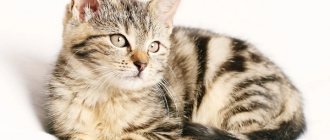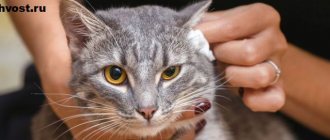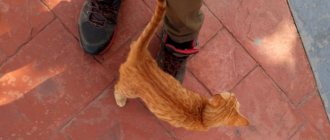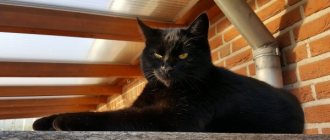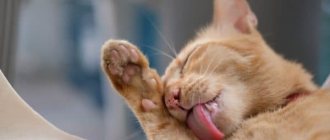Determining the cause of the disease in pets is more difficult than in people, because pets cannot talk about the nature of their illness or indicate symptoms. The owner of a four-legged friend must be attentive to his ward and try to promptly notice changes in behavior and health. If the owner notices whistling breathing in a cat, then this is a clear sign of blockage at some point between the bronchioles and the larynx. During negative processes, a narrowing of the airways is observed, therefore, when inhaling and exhaling, a characteristic whistling sound is produced.
The main causes of whistling breathing
Wheezing in a cat may indicate the following diseases:
- Heart disease. If the breeder notices changes in the behavior and well-being of the pet, then you should pay attention to the characteristic color of the lips, tongue and gums. If a gray or even blue tint of the oral cavity is detected, we can conclude that the cardiovascular system is not coping with its work and the tissues are not receiving oxygen. In this situation, you should look for the cause in the malfunction of the main organ - the heart. The veterinarian must do a cardiogram, an x-ray examination, and take blood and urine tests. After receiving the data, establishes an accurate diagnosis and prescribes adequate treatment;
- Helminthiasis. If your cat wheezes and coughs, the cause may be the presence of parasites - lungworms that live in the cavity of the respiratory organ. In this case, it is very important to assess the scale of the problem. As a rule, helminths are amenable to systemic treatment. Doctors recommend antihelminthic drugs;
- Asthma. A disease in which the animal develops severe shortness of breath, while whistling and hoarse meowing are heard. At this moment, the pet experiences a severe lack of oxygen and begins to actively breathe. Swelling of the lung tissue is very dangerous, as it can cause death. During an asthma attack, it is very important to promptly give the animal special medications that can instantly relieve swelling and allow normal breathing. Treatment in this case is prescribed systematically, with regular visits to the veterinarian for examination;
- Heart disease. Wheezing in a cat can be a characteristic sign of a heart muscle defect. To establish a diagnosis, it is necessary to undergo a hardware examination in the clinic. At the initial stage of development of the pathology, the doctor prescribes maintenance therapy for stable heart function. In severe cases, surgery may be prescribed;
- Oncological disease. Growing tumors and tissue tumors can cause breathing problems. Whistles appear as a result of blockage of the airways. Special treatment is required, including opioid drugs that reduce pain. If the doctor determines that it is possible to remove the tumor, surgery will be scheduled.
The respiratory process directly depends on the physical and mental state of the cat. When you feel normal, breathing should be even, calm, and silent. When feeling unwell, the pet begins to actively and quickly inhale air, while wheezing and whistling are heard.
Causes
If your cat stops meowing, you cannot do without an examination by a veterinarian. This is too serious a symptom, which indicates the emergence of significant health problems.
The reasons for this condition are:
- viral or infectious disease, cold;
- advanced acute respiratory infections - as a complication, a cat may develop pneumonia, viral rhinotracheitis, tonsillitis, calcivirosis, bronchial asthma;
- a foreign body in the larynx - a chicken bone, a sliver, a spruce or pine needle can damage the larynx from the inside, injure the respiratory tract, gastrointestinal tract;
- heart failure - if the cat’s behavior has become less active, she is breathing frequently, wheezing appears, there is a high probability of developing cardiovascular pathology;
- blood diseases - such ailments develop due to a lack of iron in the cat’s diet;
- hernia in the diaphragm area;
- pulmonary edema;
- allergic reaction to food taste, smell, dust;
- traumatic injuries to the respiratory system - most often they appear after a cat falls from a height or a fight;
- ascites – excess fluid in the abdominal cavity;
- swelling of the larynx after poisoning with a chemical substance (for example, household products);
- oncology.
Important! Sometimes heart problems in cats develop asymptomatically. This continues until a certain point, while the body tries to even out the situation. As soon as the reserve forces run out, the condition deteriorates sharply. Characteristic, rapidly increasing symptoms of heart failure appear, and the cat may become hoarse.
Respiratory system diseases
If your cat becomes hoarse suddenly, tracheitis may be the cause. The disease often occurs:
- due to hypothermia;
- infection by viruses or bacteria;
- drying out of the trachea itself during sleep (this usually happens in the cold season when the batteries are working);
- exposure to fumes from chemicals (for example, varnishes or paints after repairs).
A cat with tracheitis is breathing heavily with its stomach. Due to a strong barking cough, sore throat and wheezing, he is constantly in severe pain. This condition of the pet requires immediate treatment. The cat needs to be taken to the veterinary clinic as quickly as possible.
Important! If you make an appointment by phone in advance, you won’t have to wait in the hallway with a sick animal.
Pneumonia in cats can be caused by viruses, fungi or bacteria. If not treated in time, the disease leads to pulmonary edema.
Signs of this pathology in cats are:
- Wheezing with gurgling.
- Phlegmatic state, lethargy, frequent sleep.
- While breathing, the cat inflates its abdomen and its tongue protrudes from its slightly open mouth. She coughs in an attempt to get rid of the fluid in her lungs.
- The mucous membrane in the mouth has a bluish tint.
- Discharge of mucus from the nose.
- Coughing up blood with sputum.
Important! Do not delay contacting an experienced specialist. Self-medication can harm the health of a weakened pet.
In asthma, the bronchi are affected and the airways are inflamed. The bronchi narrow due to the activation of the allergic mechanism, the infection is secondary.
Symptoms of asthma development:
- A wheeze appears and the cat presses itself to the floor.
- He cranes his neck and coughs.
- The appearance of shortness of breath.
- Increasing intensity of wheezing, almost to the point of suffocation.
It is still unknown what causes feline asthma. Doctors recommend preventing the animal from coming into contact with chemical fumes, smoke, and dust accumulations.
Pleurisy often results from various cardiomyalgia. It can also develop due to the accumulation of purulent masses inside the pleural cavity. This disrupts breathing, prevents the lungs from fully expanding, and provokes wheezing.
Sometimes infectious peritonitis leads to pleurisy. The mucous membranes of the cat's tongue turn blue and she can't stop coughing. Fluid accumulates between the chest and lungs. The cat is constantly wheezing and breathing frequently.
Important! If clinical signs of pleurisy appear, you must immediately show your pet to a veterinarian and begin treatment.
Other pathologies
If your pet has weak kidneys, the final outcome of the disease is pulmonary edema. A sick cat does not eat or drink. Most of the time he is in a semi-sitting position, his sides swelling and falling rhythmically. From time to time the cat begins to cough, and the wheezing intensifies.
Malignant or benign neoplasms on organs that are located near the respiratory tract can cause hoarseness in a cat. As a rule, this indicates metastases in the lungs. Experts note that cats suffer from cancer more often than dogs.
Heavy breathing through an open mouth, wheezing of any type, or discharge from the cat's mouth or nose are sufficient grounds for consultation with a medical professional. The doctor determines the causes of the cat’s condition using tests (ultrasound, x-rays, biopsy), external examination, and history taking.
The cause of a cat's hoarse meowing is often polyps in the nasopharynx, hair inside the intestines, or small objects stuck in the throat. But most often the cat wheezes and breathes heavily with his mouth open due to the development of pulmonary or extrapulmonary pathology. Among the latter, heart disease comes first.
Statistically, overweight or older cats have an increased risk of developing heart failure. Wheezing is often a sign.
The fact that a cat is hoarse due to heart problems is indicated by:
- Severe shortness of breath after minor physical exertion.
- Cold pads on paws and ears.
- Pallor of mucous membranes (gums, palate, eyes) due to poor circulation.
- Sounds that resemble bubbling, with a background of wheezing.
- Cold skin.
After the examination, the doctor prescribes an x-ray, electrocardiography, and develops an individual treatment plan, which includes the use of dietary food.
Interesting! It happens that a cat wheezes due to a helminthic infestation. Small parasites penetrate the respiratory tract, cause nausea, and provoke a refusal to eat. As a rule, with helminthiasis, a kitten wheezes when breathing, and stool disturbances are noted.
Associated symptoms
There are a number of accompanying symptoms that are dangerous not only to the health, but also to the life of the cat. Among these are:
- wheezing (narrowing of the airways provokes the appearance of characteristic wheezing and whistling. It is not always possible to notice the symptom in a timely manner due to the constant noise. But if you lean your ear against the animal’s chest, you can clearly hear heavy, hoarse breathing. In this case, it is necessary to urgently begin antibiotic therapy);
- cough (the symptom is a protective function of the body. Thanks to coughing, the pet tries to remove foreign bodies, mucus, sputum from the bronchi. The cause may be a cold, or severe diseases of the internal organs, oncological problems);
- hoarse voice (hoarseness can be heard not only during breathing, but also when meowing. The voice shrinks against the background of growing tumors in the respiratory organ area, or colds due to which the vocal cords lose their elasticity and stretching).
Hoarseness and coughing during breathing in cats can be symptoms of serious diseases, such as calicivirosis, rhinotracheitis, laryngospasm, pneumonia, lung tumor, feline bronchial asthma, injury to the larynx with a sharp object. Hoarseness also appears due to hernial protrusion in the diaphragm, disturbances in the functioning of the cardiovascular system, and renal failure.
Treatment and prevention
The owner of the animal should not provide first aid to the pet, but quickly take it to the clinic. Only a veterinarian knows how to treat a disease that causes a cat to wheeze when breathing. The doctor prescribes conservative or surgical treatment.
Respiratory diseases can be prevented by following these rules:
- do not throw small objects on the floor;
- do not treat your pet to food with small bones;
- Vaccinate and deworm the animal in a timely manner.
Most diseases do not occur when the owner protects the cat from stress and provides adequate nutrition.
Treatment methods
There are situations when an animal suddenly stops breathing, the owner should know how to provide first aid. If breathing stops, an indirect cardiac massage must be started immediately. The cat should be placed on a flat surface in such a way that the line of the spine is straight.
Treatment is prescribed after the diagnosis has been clarified. If helminths are detected, anthelmintic drugs are given. Vitamin complexes are prescribed to maintain heart function. The cause of wheezing is determined by x-ray. Only proper treatment will quickly restore your cat's health.
How to treat difficulty breathing with wheezing in a cat
Breathing with wheezing in a cat is treated in various ways and means. It all depends on the underlying disease, which the doctor determines and prescribes treatment.
- For swelling of the larynx, drugs that relieve swelling are used
- Bronchitis requires expectorants and cough medicines
- Chemotherapy is used to eliminate tumors and neoplasms
- Most foreign bodies can be removed using endoscopy
- Pulmonary edema will require intensive care, often requiring artificial ventilation
- Brachiocephalic syndrome and paralysis will require surgery
Regardless of the cause of wheezing, treatment results will be positive if you visit the clinic in a timely manner. Call us at Belaya Medveditsa around the clock, we will be happy to help.
Sign up for wheezing treatment
POLAR BEAR
The veterinary clinic in Nizhny Novgorod "White Bear" provides all types of services for cats and dogs.
Conducts any examinations and tests in its own veterinary laboratory; the clinic operates a veterinary ambulance for animals and a 24-hour veterinarian is on call at home. Agreement on the processing of personal data
Public offer
SITE MENU
- About the clinic
- Price list for veterinary clinic services
- Treatment
- Services
- Price list for veterinary clinic services
- Vetapteka
- Contacts
- Site Map
CONTACTS
- Nizhny Novgorod st. Vyatskaya 7
- 8 (831) 437-25-27
- [email protected]
When fast breathing is normal
Rapid breathing in cats (tachypnea, inspiratory dyspnea) is characterized by an increased number of inhalations and exhalations relative to the norm. It occurs in animals for a variety of reasons.
Important! Tachypnea can be physiological or pathological. Physiological rapid breathing is a natural process of cooling the body and is necessary for faster recovery.
When this condition develops, the pet most often stretches out its front legs and arches its back. However, tachypnea does not always signal the development of any pathological condition or process in the body.
Rapid breathing may be normal:
- in the first hours after the birth of kittens;
- with a long stay in a stuffy room, in the heat (overheating);
- if the cat is very thirsty;
- after intense physical activity, active games;
- during or immediately after eating;
- in stressful situations, after a strong emotional shock (transportation, change in familiar environment).
Rapid breathing in a cat can be caused by taking certain medications. In particular, when recovering from deep anesthesia.
A cat may pant frequently during pregnancy due to hormonal changes in the body during the rut.
As a rule, all of the above factors do not represent. The respiratory function will return to normal after some time, for example, after the normalization of the emotional state, the end of games, etc.
We also note that in representatives of brachycephalic breeds, due to the specific anatomical structure of the nasal passages (flattened nose), rapid breathing, especially in the hot season, is a physiological norm.
What to do if your cat is wheezing
Wheezing is a sign that your cat may have problems with the lower respiratory tract and lungs.
Free consultation Moscow
+7(495)162-70-70
Wheezing is caused by air passing through narrowed airways. This occurs due to partial blockage, inflammation, swelling or other health problems that results in an abnormally high-pitched sound. Usually wheezing is heard when exhaling.
Sometimes wheezing can be accompanied by other respiratory signs, such as rapid or labored breathing or “coughing fits” (your cat may cough as if she is trying to say something but nothing is coming out).
In the most severe cases, your cat may feel like she is actually having difficulty breathing and will breathe with her mouth open (“ open mouth breathing ”).
Open mouth breathing is a sign of a serious disorder and requires immediate veterinary attention.
If you notice that your cat is panting or showing difficulty breathing, start by assessing the situation based on the criteria below to contact your veterinarian:
- The cat experiences difficulty breathing, which may manifest itself as wheezing.
- Wheezing accompanied by coughing or choking
- Light wheezing continues for a longer period of time
- Wheezing becomes more severe over a shorter period of time
- Lethargy, refusal to eat and drink
- Blue gum tint
- Heavy or rapid breathing
And if you see any of the following symptoms along with wheezing, contact your veterinarian immediately.
- Breathing with your mouth open
- Has difficulty catching his breath
- Cough or choking
- Very pale or bluish gums
- Accumulation of mucus in the mouth, saliva flows
- Signs of distress (asthma attack)
- Prolonged wheezing
- Impotence
Call a veterinarian Moscow
+7(495)162-70-70


